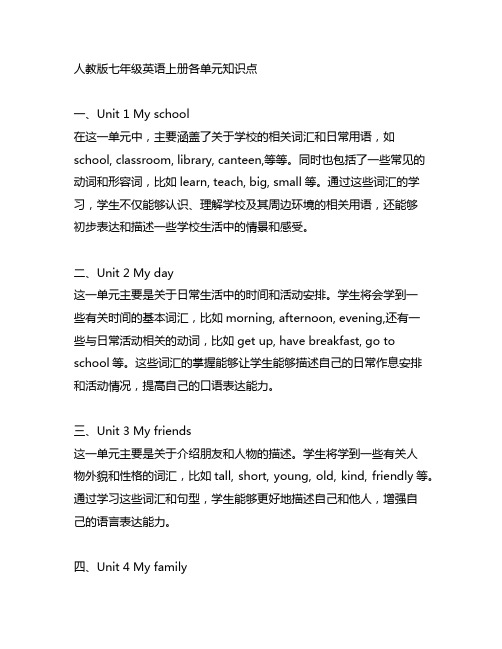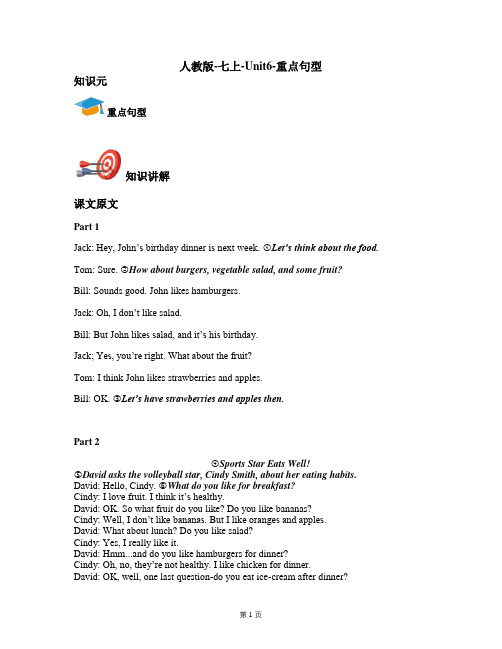人教版七年级英语上册Unit 6单元词句梳理
七上英语第六单元单词

七上英语第六单元单词人教版七年级上册英语第六单元单词详细资料。
1. banana [bəˈnɑːnə].- 词性:名词。
- 出处:人教版七年级上册英语教材Unit 6。
- 解释:香蕉。
- 造句:I like eating bananas.(我喜欢吃香蕉。
)。
- 近义词:无。
- 反义词:无。
2. hamburger [ˈhæmbɜːɡə(r)].- 词性:名词。
- 出处:人教版七年级上册英语教材Unit 6。
- 解释:汉堡包。
- 造句:He often has a hamburger for lunch.(他经常午餐吃一个汉堡包。
)。
- 近义词:sandwich(三明治,与汉堡包类似,但构造可能有所不同)。
- 反义词:无。
3. tomato [təˈmɑːtəʊ].- 词性:名词。
- 出处:人教版七年级上册英语教材Unit 6。
- 解释:西红柿。
- 造句:There are many tomatoes in the garden.(花园里有很多西红柿。
)。
- 近义词:无。
- 反义词:无。
4. ice-cream [ˈaɪskriːm].- 词性:名词。
- 出处:人教版七年级上册英语教材Unit 6。
- 解释:冰淇淋。
- 造句:She likes eating ice-cream in summer.(她喜欢在夏天吃冰淇淋。
)。
- 近义词:无。
- 反义词:无。
5. salad [ˈsæləd].- 词性:名词。
- 出处:人教版七年级上册英语教材Unit 6。
- 解释:沙拉。
- 造句:I have a salad for dinner.(我晚餐吃一份沙拉。
)。
- 近义词:无。
- 反义词:无。
6. strawberry [ˈstrɔːbəri].- 词性:名词。
- 出处:人教版七年级上册英语教材Unit 6。
- 解释:草莓。
- 造句:Strawberries are my favorite fruit.(草莓是我最喜欢的水果。
人教版七年级英语上册英语重点、难点知识总结演示教学

人教版七年级英语上册英语重点、难点知识总结演示教学七年级上册英语重点、难点知识总结:(Starter)Unit 1.1. Good morning / afternoon / evening. 早上好/ 下午好 / 晚上好。
2. How are you! 你好吗? / How is your mother? 你的妈妈好吗?I’m fine / OK, thanks. 我很好,谢谢!/ She is fine. 她身体好。
And you ? 你呢?(你好吗?)(Starter)Unit 2.1. What’s this in English? 这个用英语怎么说?What’s this? 这个是什么?It’s a map / an orange. 它是一张地图 / 它是一个桔子。
2. Spell it, please. 请拼写它。
How do you spell it? 你怎样拼写它?(Starter)Unit 3.1. What color is it? 它是什么颜色? What color is your pen? 你的钢笔是什么颜色?2. It’s red / blue / black and white. 它是红色 / 蓝色 / 黑白色。
Unit 1.1. What’s your name? 你叫什么名字?What’s her / his name? 她 / 他叫什么名字?2. What’s your first name你的名是什么?What’s your last / family name?你姓什么?(last name = family name)3. I’m Mary. = My name is Mary. 我叫玛丽。
She is Mary. = Her name is Mary. 她叫玛丽。
4. Nice to meet you! 见到你真高兴。
Nice to meet you too. 见到你也很高兴。
人教版七年级英语上册各单元知识点

人教版七年级英语上册各单元知识点一、Unit 1 My school在这一单元中,主要涵盖了关于学校的相关词汇和日常用语,如school, classroom, library, canteen,等等。
同时也包括了一些常见的动词和形容词,比如learn, teach, big, small等。
通过这些词汇的学习,学生不仅能够认识、理解学校及其周边环境的相关用语,还能够初步表达和描述一些学校生活中的情景和感受。
二、Unit 2 My day这一单元主要是关于日常生活中的时间和活动安排。
学生将会学到一些有关时间的基本词汇,比如morning, afternoon, evening,还有一些与日常活动相关的动词,比如get up, have breakfast, go to school等。
这些词汇的掌握能够让学生能够描述自己的日常作息安排和活动情况,提高自己的口语表达能力。
三、Unit 3 My friends这一单元主要是关于介绍朋友和人物的描述。
学生将学到一些有关人物外貌和性格的词汇,比如tall, short, young, old, kind, friendly等。
通过学习这些词汇和句型,学生能够更好地描述自己和他人,增强自己的语言表达能力。
四、Unit 4 My family在这一单元中,学生将会学习有关家庭成员的词汇和描述。
比如father, mother, brother, sister,还有一些家庭活动的动词,比如cook, clean, play等。
这些词汇和句型的学习能够让学生更好地表达自己家庭成员的情况,加深对家庭生活的理解。
五、Unit 5 My clothes这一单元主要是关于服装和颜色的表达。
学生将会学习有关衣物和颜色的词汇,比如shirt, dress, red, blue等。
通过学习这些词汇,学生不仅能够打开服装的表达方式,还能够更好地适应不同场合的着装和色彩搭配。
六、Unit 6 My room这一单元主要是关于家居环境和房间布置。
Unit6+Section++A 2025学年人教版英语七年级上册

go to bed 上床睡觉
He __g_o_e_s_t_o_b_e_d___ at nine o’clock.
The saying, “Early to bed, early to rise!”
/'seɪɪŋ/ n.谚语;格言
/raɪz/ v.
起床;升起
Who are they?
Lu Jiaqi and Tom.
repeat. Notice the stressed words. Then mark other stressed words in the conversation in 2a.
Lu Jiaqi: Hi! I’m Lu Jia qi, a school re porter. What’s your name?
unstressed. 实词重读,虚词弱读。
Content Words (more stress) Function Words (less stress)
名词 (paper, coffee, John) 实义动词 (talk, say, find)
形容词(tall, res, nice) 副词(often, slowly) 数词(one, two, first)
to school at 7:50.
Lu Jiaqi: When do you go home? go home 回家
Tom: Around five.
Language Points
after that 在那之后
Lu Jiaqi: What do you do after that? 吃晚饭 Tom: Sometimes I play basketball. I have dinner at half past
(全)人教版英语七年级上册各单元语法聚焦汇总

人教版7年级上册各单元语法汇总Unit1 My name’s Gina.1.---What’s your name?---Alan./I’m Alan./My name’s Alan.2.---What’s his name?---He’s Eric./His name’s Eric.3.---What’s her name?---She’s Mary./Her name’s Mary.4.---Is he Jack?---Yes,he is./No,he isn’t.His name’s Mike.5.---Are you Helen?---Yes,I am./No,I’m not.I’m Gina.Unit 2 This is my sister.1.This is my friend Jane.2.That’s my grandfather.3.These are my brothers.4.Those are my parents.5.---Who is she?---She’s my sister.6.---Who’s he?---He’s my brother.7.---Who’re they?---They’re my grandparents.Unit 3 Is this your pencil?1.---Is this your pencil?---Yes,It is.It’s mine./No,it isn’t.It’s hers.2.---Is this his green pen?---Yes,It is./No,it isn’t.The blue pen is his.3.---Is that your school bag?---Yes,It is./No,it isn’t.It’s his.4.---Are these your books?---Yes,they are./No,they aren’t.They’re hers.5.---Are those her keys?---Yes,they are./No,they aren’t.They’re mine.缩写:it’s=it is isn’t=is not aren’t= are notUnit 4 Where’s my schoolbag?1.---Where’s the map?---It’s in your grandparents’ room.2.---Where are my books?---They’re on the sofa.3.---Where’s his pencil box?---It’s in his schoolbag.4.---Where’s your ruler?---It’s under the chair.5.---Where are their keys?---They’re on the table.Unit 5 Do you have a soccer ball?1.---Do you have a baseball?---Yes,I do./No,I don’t.I have a volleyball.2.---Do you have a ping-pong Bat?---Yes,I do./No,I don’t.I have a ping-pong ball.3.---Does she have a tennis ball?---Yes,she does./No,she doesn’t.She has a baseball.4.---Does he have a soccer ball?---Yes,he does./No,he doesn’t.He has two ping-pong bats.5.---Do they have a basketball?---Yes,they do./No,they don’t.They have a volleyball.缩写:don’t = do not doesn’t = does notUnit 6 Do you like bananas?1.---Do you like salad?---Yes,I do./No,I don’t.2.---Do they like pears?---Yes,they do./No,they don’t.3.---Does she like tomatoes?---Yes,she does./No,she doesn’t.4.I like oranges.I don’t like bananas.5.We like rice.We don’t like hamburgers.6.He likes ice-cream.He doesn’t like vegetables.Unit 7 How much are these socks? 1.--How much is the hat?--It’s five dollars.2.--How much is this T-shirt?--It’s seven dollars.3.--How much is that brown sweater? --It’s eight dollars.4.--How much are these socks?--They’re two dollars.5.--How much are those black trousers? --They’re nine dollars.Unit 8 When is your birthday?1.--When is your birthday?--My birthday is on May 2nd.2.--When is his birthday?--His birthday is on January 17th.3.--When is her birthday?--It’s in August.4.--When is Alice’s birthday?--Her birthday is on September 5th. 5.--When is your father’s birthday?--His birthday is on April 21st.Unit 9 My favorite subject is science.1.--What’s your favorite subject?--My favorite subject is science.2.--What’s his favorite subject?--His favorite subject is Chinese.3.--What’s her favorite subject?--Her favorite subject is art.4.--Why does Bob like history?--Because it’s interesting.5.--Why do Frank and Bob like P.E.?--Because it’s fun.6.--Who is your music teacher?--My music teacher is Ms.Xie.7.--When is your geography class?--It’s on Monday and Friday.。
2021年七年级上册英语人教版-第六单元重点句型《讲义教师版》

人教版-七上-Unit6-重点句型知识元重点句型知识讲解课文原文Part 1Jack: Hey, John’s birthday dinner is next week. ①Let’s think about the food. Tom: Sure. ②How about burgers, vegetable salad, and some fruit?Bill: Sounds good. John likes hamburgers.Jack: Oh, I don’t like salad.Bill: But John likes salad, and it’s his birthday.Jack; Yes, you’re right. What about the fruit?Tom: I think John likes strawberries and apples.Bill: OK. ③Let’s have strawberries and apples then.Part 2④Sports Star Eats Well!⑤David asks the volleyball star, Cindy Smith, about her eating habits. David: Hello, Cindy. ⑥What do you like for breakfast?Cindy: I love fruit. I think it’s health y.David: OK. So what fruit do you like? Do you like bananas?Cindy: Well, I don’t like bananas. But I like oranges and apples.David: What about lunch? Do you like salad?Cindy: Yes, I really like it.David: Hmm...and do you like hamburgers for dinner?Cindy: Oh, no, they’re not healthy. I like chicken for dinner.David: OK, well, one last question-do you eat ice-cream after dinner?Cindy: Err... I like ice-cream...but I don’t eat it. I don’t want to be fat.句型讲解1. Let’s think about the food.翻译:让我们想想食物。
人教版初一上册英语第六单元unit 6语法篇

Unit6语法篇可数名词与不可数名词1. 从名词所表示的事物的性质来看,名词可分为可数名词和不可数名词两类。
可数名词有复数形式,不可数名词一般没有复数形式。
2. 可数名词是可以计数的,它们可分为单数和复数两种形式。
指单个人或事物时,用单数形式,如:a pencil一支铅笔;指两个或多个人或事物时,用复数形式,如:two pencils 两支铅笔。
3. 名词复数的变化规则:(1) 一般在词尾加-s。
book→ books bag→ bags(2) 以s, x, ch, sh结尾的名词,一般在词尾加-es。
class→ classes watch→ watches(3) 以“元音字母+y”结尾的名词,在词尾加-s。
boy→ boys(4) 以“辅音字母+y”结尾的名词,先变y为i,再加-es。
strawberry→ strawberries family→ families(5)以f或fe结尾的名词,将f或fe变为v,再加-es。
knife→ knives wife→ wives(6)一些以字母o结尾的名词变复数时有的加-es,有的加-s。
Negro→ Negroes hero→ heroestomato→ tomatoes potato→ potatoes4. 不可数名词没有复数形式,不能直接用数词来表示数量,如果要表示数量,必须借助于其他词来完成。
若用“计量单位词+of短语”表示,其数量也应通过of前面的名词体现出来。
a glass of water 一杯水two glasses of water 两杯水单项选择1. ---Where are you going , Sam?---There isn't any in the fridge . I'll go and buy some .A. vegetablesB. beefC. eggsD. money2. ---How many are there ?---About fifty .A. tomatosB. tomatoesC. tomato3. ---Let's make a banana milk shake . What do we need ?---We need some and two .A. bananas; cup of milkB. bananas; cups of milkC. bananas; milks4.---What can I do for you?---I want .A. two glass of orangesB. two glasses of orangesC. two glasses of orangeD. two glasses orange5. ---I'm thirsty . May I have something to drink ?---Ok. Here's some .A. riceB. breadC. water6.---What do you have for breakfast ?---I often have and .A. breads; eggsB. bread; eggC. breads; eggD. bread; eggs7. ---There are some and in the fridge (冰箱).A. tomatos; milkB. tomatos; milksC. tomatoes; milkD. tomatoes; milks一、短文填空(用方框内所给词的适当形式填空, 使短文完整、通顺)hamburger, health, star, well, eat, banana, like, chicken, tomato, haveJenny is my cousin. She is an English girl. She 1 sports. She2 two ping-pong balls and one baseball. Her favorite(最喜欢的) 3is Li Na. She plays baseball very 4 . Jenny is very 5 . She only6 healthy food. For fruit, she has apples and7 . For vegetables,she has carrots and 8 . For meat(肉), she has 9 . She doesn’t have10 or ice-cream. She thinks they are not good for her health.1. 2. 3. 4. 5.6. 7. 8. 9. 10.二、单词拼写1.There are some ________(西红柿)in the basket.2. We should eat lots of __________(蔬菜)3. The little girl likes _____________(草莓)a lot.4. I like f__________, for example(例如): apples, bananas and oranges.25. Give him two ____________. (汉堡)三、翻译(根据中文提示完成句子)1.水果和蔬菜是健康食品。
2021年七年级上册英语人教版-第六单元重点词汇《讲义教师版》

人教版-七上-Unit6-重点词汇知识元重点词汇知识讲解1. tomato /təˈmɑːtəʊ/ n. 西红柿辨析例句(1)tomato为可数名词,意为“西红柿”I want a tomato.(2) tomatoes为tomato复数形式,因为tomato是以字母“o”结尾的有生命的可数名词,其后加-es. 巧记:黑人(Negro)英雄(hero)爱吃土豆(potato)和西红柿(tomato),真有意思(es) There are three tomatoes on the table.2. salad /'sæləd/ n. 沙拉用法例句(1)salad意为沙拉,名词,它是音译过来的。
salad是西餐中一道经典的凉拌菜。
沙拉中也有水果沙拉(fruit salad)、土豆沙拉(potato salad)、海鲜沙拉(seafoodsalad)等多个品种。
Do you like fruit salad?(2) 音译的外来食品:hamburger汉堡包sandwich三明治My brother likes having hamburgers for his breakfast.3. milk /mɪlk/ n./v. 牛奶;挤奶辨析例句(1)不可数名词,意为“牛奶”I don’t like milk.(2) 动词,意为“挤奶”He is milking a cow.4. bread /bred / n. 面包辨析例句(1)bread为不可数名词,意为“面包”,不与不定冠词a或者数词连用。
They often have some milk and bread for breakfast.(2) a piece of bread意为“一片面包”I want to eat a piece of bread.5. right / raɪt / n./adj. 正确;右边;正义;正确的;直接的;右方的辨析例句(1) 形容词,意为“右边的”时,其反义词为left,意为“左边的”。
- 1、下载文档前请自行甄别文档内容的完整性,平台不提供额外的编辑、内容补充、找答案等附加服务。
- 2、"仅部分预览"的文档,不可在线预览部分如存在完整性等问题,可反馈申请退款(可完整预览的文档不适用该条件!)。
- 3、如文档侵犯您的权益,请联系客服反馈,我们会尽快为您处理(人工客服工作时间:9:00-18:30)。
1
人教版七年级英语上册Unit 6 Do you like bananas?
Period 1 Section A(1a-2d)
必背单词
1.banana n.香蕉→some bananas一些香蕉
2.hamburger n.汉堡包→burger n.(=hamburger)汉堡包
3.tomato n.西红柿→(复数)tomatoes
4.ice-cream n.冰激凌
5.salad n.沙拉
6.strawberry n.草莓→(复数)strawberries
7.pear n.梨
8.milk n.牛奶→a cup of milk一杯牛奶
9.bread n.面包→a piece of bread一片面包
10.birthday n.生日→one's birthday某人的生日
11.dinner n.(中午或晚上吃的)正餐→have dinner吃晚餐
12.week n.周,星期→this week这周
13.food n.食物
14.sure adv. 当然;肯定;一定→(同义词<组>)certainly/of course
15.vegetable n.蔬菜
16.fruit n.水果→fruits各种各样的水果
17.right adj. 正确的;适当的→(反义词)wrong adj. 错误的
18.apple n.苹果→an apple一个苹果
19.then adv. 那么
必背短语
2
20.birthday dinner生日宴会
21.next week下星期,下周
22.think about思考,思索
23.sounds good听起来不错
必背句子
24.—Do you like bananas?
你喜欢香蕉吗?
—Yes, I do. / No, I don't.
是的,我喜欢。/不,我不喜欢。
25.—Let's think about the food.
让我们来想想(吃什么)食物吧。
—Sure. 没问题。
26.—How about burgers, vegetable salad, and some fruit?
来点汉堡包、蔬菜沙拉和一些水果怎么样?
—Sounds good.
听起来不错。
27.Yes, you're right.
是的,你是对的。
Period 2 Section A(Grammar Focus-3c)
必背单词
1.egg n.蛋;鸡蛋→an egg一个鸡蛋
2.carrot n.胡萝卜
3
3.rice n.大米;米饭→a bowl of rice一碗米饭
4.chicken n.鸡肉(不可数名词)→chicken n. 鸡(可数名词)
5.so conj. (引出评论或问题)那么
必背句子
6.—Does she like tomatoes?
她喜欢西红柿吗?
—Yes, she does. /No, she doesn't.
是的,她喜欢。/不,她不喜欢。
7.I like fruit, but I don't like vegetables.
我喜欢水果,但我不喜欢蔬菜。
8.She likes bread, but she doesn't like salad.
她喜欢面包,但她不喜欢沙拉。
Period 3 Section B(1a-1e)
必背单词
1.breakfast n.早餐;早饭→have breakfast吃早餐
2.lunch n.午餐→have lunch吃午餐→have a big lunch吃一顿丰盛的午餐
必背句子
3.—Does Tom like carrots?
汤姆喜欢胡萝卜吗?
—Yes,he does. 是的,他喜欢。
Period 4 Section B(2a-2c)
必背单词
4
1.star n.明星;星星→sports star运动明星
2.eat v.吃→eat well吃得好→eating(现在分词)
3.well adv. 好;令人满意地→good adj. 好的
4.habit n.习惯→eating habits饮食习惯→a healthy eating habit一个健康的
饮食习惯
5.healthy adj. 健康的→health n.健康→healthily adv. 健康地
6.really adv. 真正地→real adj. 真的
7.question n.问题→ask/answer questions问/回答问题
8.want v.需要;想要→want to do sth.
9.be v.变成→be v.是(am, is, are的原形)
10.fat adj. 肥的;肥胖的→(反义词)thin adj. 瘦的→(同义词)heavy adj重的
必背短语
11.healthy food健康食物
12.ask. . . about. . . 问……关于……
13.have. . . for breakfast/lunch/dinner早/中/晚餐吃……
必背句子
14.What do you like for breakfast/lunch/dinner?
早/中/晚餐你喜欢吃什么?
15.I think it's healthy.
我认为它是健康的。
16.What about lunch?
午餐怎么样?
5
17.I like chicken for dinner.
晚餐我喜欢吃鸡肉。
18.I don't want to be fat.
我不想变胖。
